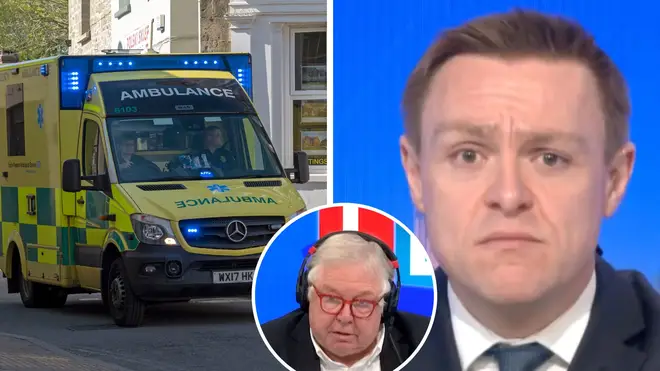
James O'Brien 10am - 1pm
20 December 2022, 08:36 | Updated: 20 December 2022, 15:43

Armed forces personnel will not drive ambulances through red lights during strike action because it "wouldn't be right to ask them to do so".
Health minister Will Quince defended the role of the 750 military servicemen and women who will help ambulance trusts where staff are striking.
Action is due to take place on Wednesday, with trusts negotiating locally about how much service will be provided.
It's led to fears of long wait times for patients suffering problems like heart attacks, while one ambulance chief said the best case scenario was everybody staying at home and not getting ill in a stark warning.
It has been confirmed that while some troops been trained to drive ambulances, they will not be gunning them through junctions at red lights. Their role will instead be focused on non-emergency support.

Nick Ferrari slams Minister over 'farce' of armed forces driving ambulances
Mr Quince said that would be breaking the law and pointed to how much training is needed to safely drive ambulances in that way, after criticism as to how much use the hamstrung soldiers would be in an emergency situation.
"They're not going to be going through red lights, they're not going to be putting their blue lights on," he told LBC's Nick Ferrari at Breakfast.
"Because we can't have them break the law, and it wouldn't be right to ask them to do so."
Nick fired back asking why they would be asked to "drive tanks to the Ukraine border" but not race to hospital through red lights if a patient is in the back dying of a heart attack.
"The expectation is the emergency and critical incidents will still be covered by paramedics and ambulance staff as part of minimum service guarantees.
"The armed forces are there in a support capacity to drive ambulances, they're stepping in… some responses to blue lights, ambulances, police are irrational at best.

Nursing union chief says pay discussions must be on the table
"It does take considerable training, what we can't do is either put our armed forces personnel, those in the ambulance or indeed the wider public, at risk.
"I hear your point… I wouldn't want to put them in that position. They're there in a support role."
Health secretary Steve Barclay was due to meet speak to unions on Tuesday, ahead of the planned action by workers including paramedics, control room staff and technicians. Strikes have been called by GMB, Unite and Unison.
GMB said representatives only got 30 minutes with Mr Barclay and no breakthrough was reached.
NHS bosses said patients suffering from heart attacks, strokes or broken bones might need to take themselves to hospital.
Hospital and ambulance services across the East Midlands, the North East, the North West and Wales have declared critical incidents.
"The best we can hope for is that everyone stays indoors, no one falls over, no one gets ill and no one has a car crash," said an NHS ambulance boss.
The strikes will follow the nurses' strike held on Tuesday as the NHS enters the vital December period in a state of crisis.